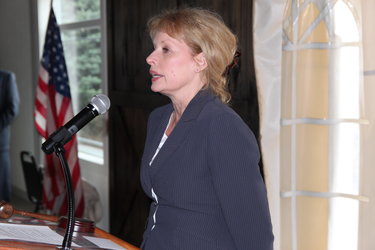Bohl resigns
GUILDERLAND — Councilwoman Laurel Bohl resigned from the Guilderland Town Board at the close of Tuesday night’s board meeting.
The other board members looked visibly surprised as Bohl read a prepared statement.
“For personal reasons that I cannot discuss, today I am tendering my resignation from the town board of Guilderland, effective immediately,” she said.
“I want everyone to know this has been an extremely difficult decision for me that I do not take lightly,” she said, thanking those who voted for her.
“You have always been my top priority and concern; the single motivating factor in my decision to run and in all the decisions I have made while sitting in this seat.”
She had served two-and-a-half years of her four-year term.
After she read her statement, Bohl addressed the board members saying, “You don’t need me for the executive session because you have a quorum already. So I’ll be on my way.”
She quickly left the meeting hall, after which Supervisor Peter Barber said, “I don’t think anyone here expected that.”
The three remaining councilwomen signaled their agreement.
“I don’t see how that serves the town at all,” said Councilwoman Rosemary Centi.
Councilwoman Christine Napierski responded that Bohl may have personal reasons.
Bohl did not divulge her reasons to The Enterprise but at the end of her statement, she did urge people to watch for a letter to the Enterprise editor with more details. No letter had arrived before press time.
In her statement, Bohl said that representing “average residents” had been one of the highest honors in her life.
“My only goals were to get your voices heard, get your questions answered, and to help safeguard the character and natural beauty of the town, and the quality of life of every resident,” Bohl said in her prepared statement.
She also said that she had submitted her name to serve on the yet-to-be formed 16-member Comprehensive Plan Committee, which is to update the town’s 20-year-old original plan.
“This new comprehensive plan will control much of the fate of this town for the next 20 years,” Bohl said. “On that committee, I will not let special interests, politicians, or big money control the decisions. I will continue to make sure the residents’ voices are factored into each and every decision made for our town’s future.”
The Enterprise asked Bohl how she could serve on the committee if she was unable to serve on the town board. She responded that the committee work would not be as demanding or intensive. “I just want to stay involved,” she said.
Often alone
Bohl, a lawyer who works in the state Attorney General’s Office, was instrumental in forming a citizens’ group now known as the Guilderland Coalition for Responsible Growth. She relinquished her role as leader of the grassroots group when she ran for town board.
Bohl was a surprise candidate at the April 2019 Democratic caucus, nominated by her husband.
After winning the election, Bohl wrote to Guilderland residents in a letter to the Enterprise editor, “This was truly a grassroots movement and, over the last several months, I tried to personally reach as many of the voters as I possibly could with my message of protecting the environment, giving the residents a real valued voice in their town, and curbing some of the recent overreach of development so as to hold onto the character of Guilderland as a small town, with diversity and opportunity for everyone.”
Although she took office on a board made up entirely of Democrats, she was often at odds with other members and in a number of significant issues cast the sole dissenting vote.
In August 2020, Bohl cast the lone “no” vote in the town board’s resolution to let the Champlain Hudson Power Express Inc. run underground lines through the town to bring electric power from Canada to the New York City area.
“The people that oppose this are not just Canadians,” said Bohl, naming the Sierra Club, Hudson Riverkeeper, New York electric companies, New York clean-energy companies, and 22 labor unions as opposing the project. “Hydroelectricity from large dams is not really renewable energy,” said Bohl.
Speaking for the majority, Supervisor Peter Barber countered that he didn’t disagree that there are valid concerns about indigenous people and about the environment “but ultimately,” he said, “this is a decision of the Public Service Commission, which has exclusive jurisdiction of both the permitting and siting of utility and transmission lines.” The project has since gotten PSC approval.
In December 2020, Bohl cast the sole dissenting vote on the town board’s motion to appeal the decision that halted Pyramid’s progress with some large building projects. Barber argued for the town of Guilderland in court and was successful in overturning the lower court’s decision.
So construction of a 222-unit development on Rapp Road as well as a proposed Costco Wholesale store can go forward.
In January 2021, Bohl opposed reappointing the long-time chairman of the planning board, Stephen Feeney.
She cited “an extremely harsh rebuke” from Supreme Court Justice Peter Lynch on the planning board’s approval of Pyramid Management Group’s plans to build the Costco and apartment complex near its Crossgates Mall.
Bohl alone called for new leadership and said the planning board almost always votes unanimously, indicating its “not functioning quite properly.” While Bohl saw Feeney as problematic, Barber sees Feeney as not just experienced but as heroic in helping the town.
More recently, this past April, Bohl alone vehemently advocated for apartment dwellers as well as property owners being notified by the town about public hearings on projects in their neighborhoods.
At June’s town board meeting, as the town board considered a proposed rule that a board chairperson “may announce rules that prescribe the time to be allotted to each speaker and the number of times each speaker may speak,” Bohl alone pushed back against time limits for citizens to speak.
Bohl asserted it would be difficult for a resident to say, in just three minutes, how a proposed project would affect their quality of life. “The large projects will have the most effect,” she said, stating that everyone has the right to speak.
“Do we want people to have a free and open robust debate?” she asked.
At the July meeting, before she announced her resignation, Bohl had cast the lone vote against the town applying for a Smart Growth Community Planning and Zoning Grant, to help with the new comprehensive plan, because she said she would need to see the application first.
Bohl read some of the Smart Growth values that she thought might not be good for Guilderland, like emphasizing density. “I would be wary if we’re going to commit to principles this soon in the process,” Bohl said.
Bohl said she would want to see the details before applying, stating, “The devil is in the details.”
Councilwoman Christine Napierski, who had sparred with Bohl during the discussion, said that she also would like to see the application but voted in favor. “If we don’t [apply], we don’t get the money …. I don’t want to miss out,” said Napierski.
What’s ahead?
According to the state’s Town Law, the town board can appoint someone to fill the vacancy left by Bohl’s departure with a majority vote.
“If the appointment be made to fill a vacancy in an elective office, the person so appointed shall hold office until the commencement of the calendar year next succeeding the first annual election at which the vacancy may be filled,” the law says.
Because there are more than 90 days until the general election in November, the political parties in town will be able to field candidates for that election to fill the seat.
By the 2021 election, Guilderland Democrats had moved from a caucus system for selecting candidates to a primary. Napierski, after the Democratic Committee had chosen someone else to run for town justice — a post she was appointed to, filling a vacancy — unsuccessfully challenged the caucus process in court, and then pushed for a change to a primary system,
The June 2021 primary featured a four-way race for two spots where the key issue was development.
Napierski, one of a pair of challengers to the Democratic Committee’s two picks, came in first with 26 percent of the vote. Her running mate, Kevin McDonald — one of the Westmere residents who challenged Pyramid’s building projects in court — came in last with 21 percent.
Incumbent Paul Pastore — who was backed by the committee — was ousted with 24 percent of the vote while his running mate, Amanda Beedle, came in second, securing the Democratic line for November, with 25 percent of the vote.
Beedle and Napierski then campaigned together, despite their differences: Napierski had opposed Pyramid’s Costco and apartment complex plans while Beedle, as a member of the planning board, had supported the projects.
The two Democrats bested their Republican challengers to win seats on the town board: Napierski was the top vote-getter with 26 percent; Beedle garnered 23 percent.
While Pastore didn’t actively campaign after the primary, although he had the Conservative line, McDonald did campaign ardently on the Working Families line and was strongly backed by Bohl. He got 7 percent of the vote while Pastore got 4 percent.



